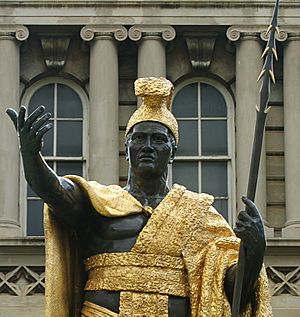Battle of Mokuohai facts for kids
Quick facts for kids Battle of Mokuʻōhai |
|||||||
|---|---|---|---|---|---|---|---|
| Part of Unification of Hawaii | |||||||
 King Kamehameha I |
|||||||
|
|||||||
| Belligerents | |||||||
| Kamehameha I's army | Kiwalaʻo | ||||||
| Commanders and leaders | |||||||
| Kamehameha I Keʻeaumoku Kameʻeiamoku Kamanawa |
Kiwalaʻo Keōua Kuahuʻula Keawemauhili |
||||||
The Battle of Mokuʻōhai was a very important fight that happened in 1782 on the island of Hawaiʻi. It was one of the first big battles in Kamehameha I's plan to unite all the Hawaiian Islands. This battle was his first major victory, and it helped him become a strong leader over a large part of the island.
Contents
How the Battle Started
After King Kalaniʻōpuʻu passed away in the spring of 1782, his family took his body to a special royal burial place. This place was called Hale o Keawe at the important religious temple Puʻuhonua o Hōnaunau.
Who Inherited What?
King Kalaniʻōpuʻu's son, Kīwalaʻō, was supposed to become the new king. However, his nephew, Kamehameha, was given a special religious job. He also received the land area of Waipiʻo valley.
A New Leader Emerges
Soon, a group of important chiefs from the Kona district decided to support Kamehameha instead of Kīwalaʻō. These chiefs included Kamehameha's brothers and uncles, such as Keaweaheulu, the twins Kamanawa and Kameʻeiamoku, and Keʻeaumoku Pāpaʻiaheahe. Kamehameha was happy to accept their help and traveled from his home in Kohala to meet them.
A Challenge to Honor
Kīwalaʻō's half-brother, Keōuakūʻahuʻula, was left without any land after his father died. He became very angry. To show his anger, he cut down sacred coconut trees that belonged to Kamehameha. This was a huge insult. He also killed some of Kamehameha's men. Their bodies were offered as a sacrifice to Kīwalaʻō, who accepted them. Because of this, Kamehameha felt he had to fight back to protect his honor.
The Battle Itself
The battle took place just south of Kealakekua Bay. This area is near a community called Keʻei today. The bay where the fight happened is now called Mokuʻakae. The name Mokuʻōhai means "grove of ʻōhai trees." The ʻōhai tree is now an endangered plant and no longer grows in that area. So, we only know the exact spot from old stories passed down through generations.
A Place of Safety
As tensions grew, women and children from both sides went to the "place of refuge," Puʻuhonua o Hōnaunau. This was a safe place where people could go during times of war.
Key Moments in the Fight
During the battle, Kameʻeiamoku was one of the first leaders to get hurt. When Kīwalaʻō came closer, Kamanawa quickly came to help Kameʻeiamoku. Then, Kīwalaʻō was hit by a sling stone and fell down. Sadly, the injured Kameʻeiamoku died. During this battle, Kamehameha the Great captured Kīwalaʻō's famous red feather cloak. This cloak is now kept at the Bishop Museum.
What Happened After the Battle
After the battle, Keawemaʻuhili, who was Kīwalaʻō's uncle, was captured. But he managed to escape and fled to Hilo. Keōuakūʻahuʻula also escaped to Kaʻū, where he had family.
Dividing the Island
After the Battle of Mokuʻōhai, Kamehameha controlled the northern and western parts of the Big Island. This included the areas of Kona, Kohala, and Hāmākua. Keawemaʻuhili controlled Hilo, and Kīwalaʻō's half-brother, Keōuakūʻahuʻula, controlled Kaʻū.
Kamehameha's Continued Efforts
Kamehameha had to fight many more battles over several years to fully control the island. In 1790, Keōua's group had their footprints frozen into volcanic ash. Then, in 1791, Kamehameha's forces finally defeated and killed Keōua at Puʻukoholā Heiau. This battle was a big step in Kamehameha's journey to unite all the Hawaiian Islands.
 | Aaron Henry |
 | T. R. M. Howard |
 | Jesse Jackson |

